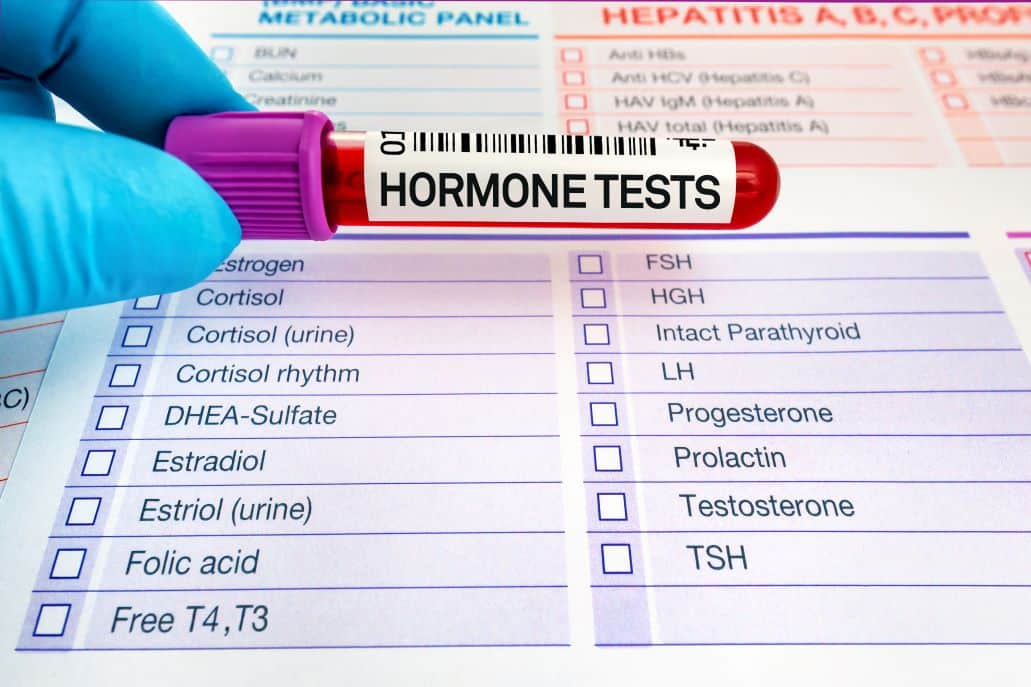Bioidentical hormone replacement therapy (BHRT) doctors require extensive testing, including urine testing, to assess the hormonal status of their patients and determine the most appropriate course of treatment. The specific reasons for ordering urine testing as part of the evaluation process can include the following:
Comprehensive Hormone Assessment
Urine testing allows for the measurement of various hormones and their metabolites, providing a more comprehensive view of a patient’s hormonal profile. This can include sex hormones (e.g., estrogen, progesterone, testosterone), adrenal hormones (e.g., cortisol), and thyroid hormones (e.g., T3 and T4).
Click Here To Learn About At-Home Hormone Testing
Monitoring Hormone Levels
By analyzing urine samples, doctors can track hormone levels over time and ensure that hormone replacement is achieving the desired effects. This allows for adjustments to the treatment plan if necessary.
Evaluation of Hormone Metabolism
Urine testing can reveal how hormones are metabolized and cleared from the body. This information helps doctors understand how efficiently hormones are being processed, which may impact treatment decisions.
Individualized Treatment
Each patient’s hormonal needs and responses to HRT can vary significantly. Comprehensive urine testing can provide valuable insights into the patient’s unique hormonal patterns, allowing for more personalized and targeted treatment approaches.
Click Here To Learn About Bioidentical Hormone Replacement Therapy
Assessing Hormonal Imbalances
Hormonal imbalances can lead to various health issues. Urine testing helps identify these imbalances, guiding the doctor in designing an appropriate treatment plan to address the specific hormone deficiencies or excesses.
Safety Monitoring
Hormone replacement therapy, especially when involving bioidentical hormones, needs careful monitoring to ensure patient safety. Regular urine testing can help detect any unexpected fluctuations in hormone levels that may require adjustments to the treatment regimen.
Evaluating Treatment Efficacy
Urine testing can gauge how well the BHRT is working and whether the treatment is providing the desired benefits, such as symptom relief and improved well-being.
It’s important to note that urine testing is just one aspect of a comprehensive evaluation when considering BHRT. Doctors may also use blood tests and assess a patient’s medical history, symptoms, and overall health to make informed decisions about bioidentical hormone replacement therapy. The combination of these diagnostic tools help ensures that BHRT is tailored to the individual needs of each patient, optimizing treatment outcomes while minimizing potential risks.
Customizing a bioidentical hormone replacement therapy (BHRT) program is essential because every individual’s hormonal needs and health conditions are unique. Hormones play a crucial role in regulating numerous bodily functions, and imbalances can lead to a wide range of symptoms and health issues. Customizing a BHRT program allows healthcare providers to tailor the treatment to each patient’s specific requirements, offering several important benefits:
- Addressing Individual Hormonal Imbalances
- Optimal Treatment Efficacy
- Minimizing Side Effects
- Safety and Monitoring
- Consideration of Underlying Health Conditions
- Tailored Delivery Methods
- Individual Goals and Preferences
- Long-Term Health Considerations
- Integrating Lifestyle Factors
By tailoring the therapy to each patient, healthcare providers can optimize the benefits of BHRT while minimizing potential risks, helping individuals achieve better hormonal balance and overall well-being.

